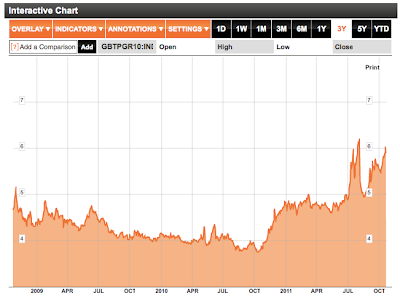Monday, October 31, 2011
Friday, October 28, 2011
Thursday, October 27, 2011
Wednesday, October 26, 2011
Monday, October 24, 2011
Saturday, October 22, 2011
Wednesday, October 19, 2011
Peak Oil for Economists
A few quick thoughts on Jim Hamilton's new magnum opus. The paper is essentially a summation of Jim's current thinking on the evidence that peak oil is near enough to care about and that it's likely to be quite economically disruptive. It is thoroughly researched, superbly argued, and very clearly written, as one would expect from this author. I hope and expect that it will be quite influential in getting economists to take the whole subject more seriously.
In terms of the content, long-time readers of mine will probably find a limited amount they didn't already know and little to disagree with. Six years ago, when I first began exploring and blogging about peak oil, Jim and I had some spirited debates on his blog as well as at The Oil Drum (see here for a flavor). However, I like to think that we are both empirical and pragmatic and six years of additional data have been enough to cause our views to increasingly converge.
The one thing that I think is sad (though perhaps understandable) is that one will search the references in vain for names like Hubbert, Campbell, Laherrere, Hirsch, Hall, etc. The argument is couched completely without reference to the line of thinkers about peak oil that stretches back over the last fifty years. Given the enormous walls of incredibility that prevent diffusion of thought between academic disciplines, that is arguably necessary to make a persuasive case to macroeconomists. However, from the standpoint of giving intellectual credit where it is due, it's unfortunate that it's not possible to recognize that a number of thinkers had earlier come to quite similar conclusions using their own methods (even where one might disagree with aspects of those methods - disagreements one is free to note).
In terms of the content, long-time readers of mine will probably find a limited amount they didn't already know and little to disagree with. Six years ago, when I first began exploring and blogging about peak oil, Jim and I had some spirited debates on his blog as well as at The Oil Drum (see here for a flavor). However, I like to think that we are both empirical and pragmatic and six years of additional data have been enough to cause our views to increasingly converge.
The one thing that I think is sad (though perhaps understandable) is that one will search the references in vain for names like Hubbert, Campbell, Laherrere, Hirsch, Hall, etc. The argument is couched completely without reference to the line of thinkers about peak oil that stretches back over the last fifty years. Given the enormous walls of incredibility that prevent diffusion of thought between academic disciplines, that is arguably necessary to make a persuasive case to macroeconomists. However, from the standpoint of giving intellectual credit where it is due, it's unfortunate that it's not possible to recognize that a number of thinkers had earlier come to quite similar conclusions using their own methods (even where one might disagree with aspects of those methods - disagreements one is free to note).
Tuesday, October 18, 2011
Monday, October 17, 2011
Friday, October 14, 2011
Thursday, October 13, 2011
Wednesday, October 12, 2011
Tuesday, October 11, 2011
Peak Supermajor was in 2005?
Labels:
BP,
chevron,
conocophillips,
exxon,
oil production,
peak oil,
shell,
total
Monday, October 10, 2011
Wednesday, October 5, 2011
Steve Jobs
This doesn't have much to do with the theme of this blog but, Ah Shit. I've personally been using Steve Jobs computers since I bought a NeXT Station and laster printer in 1991 with $10k of my fellowship money in grad school. I still have it: last time I checked, it still worked. Except for a couple of brief unhappy intervals when I was obliged to use Windows systems, I've been immersed long hours every day in Steve Jobs approved environments ever since. It's impossible not to grieve his passing, and copiously. He has almost single-handedly stood for the idea that technological devices should also be an artistic and harmonious fit with the human psyche. He was the world's greatest product manager.
It isn't going to be the same without him.
It isn't going to be the same without him.
Tuesday, October 4, 2011
Monday, October 3, 2011
Subscribe to:
Comments (Atom)


















